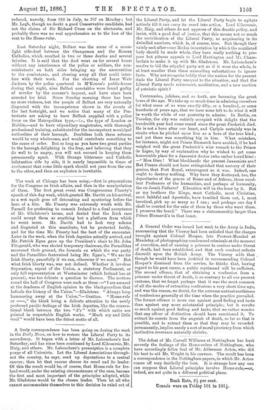A General Order was issued last week to the Army
in India, announcing that the Viceroy had been satisfied that the charges brought against Colonel Hooper, late Provost-Marshal at Mandelay, of photographing condemned criminals at the moment of execution, and of causing a prisoner to confess under threat of death, had been established, and that such conduct reflects discredit upon the British Army. The Viceroy adds that though he would have been justified in recommending Colonel Hooper's dismissal from the service, he thinks that, having regard to his past career, a public reprimand will be sufficient. The second offence, that of obtaining a confession from a prisoner under threat of death, is so contrary to all our present customs, that we forget perhaps that it was the most common of all the modes of extracting confessions a very short time ago, and was the reason, no doubt, for the extreme untrustworthiness of confessions generally at the time when the practice prevailed. The former offence is more one against good feeling and taste than against any more substantial principle ; but it revolts so much against good feeling and taste, that we rather wonder that any officer of distinction should have sanctioned it. To extract its secrets from the anguish of death, so far as that is possible, and to extract them so that they may be recorded permanently, implies surely a sort of moral pruriency from which instinctive reverence naturally shrinks.


































 Previous page
Previous page